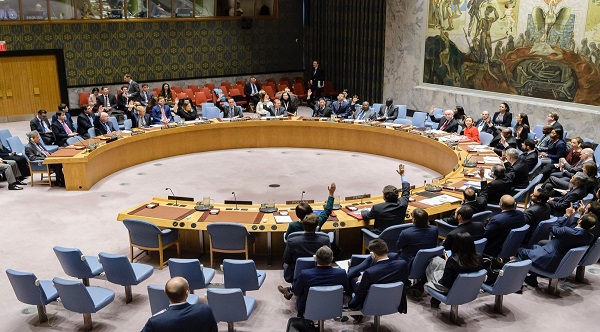The United Nations Security Council has unanimously approved the deployment of dozens of observers to the strategic Yemeni port city of Hudaydah for six months to monitor a truce reached during the latest round of UN-sponsored peace negotiations in Sweden last month, Press TV reported.
The 75 unarmed monitors will be sent to Hudaydah, located 150 kilometers southwest of the capital Sana’a, as well as to the ports of Saleef and Ras Issa.
The resolution calls on UN Secretary-General Antonio Guterres to “expeditiously” deploy the United Nations Mission to support the Hudaydah Agreement (UNMHA), led by retired Dutch General Patrick Cammaert.
Guterres described the mission as a “nimble presence” reporting on violations in Hudaydah, which serves as Yemen’s lifeline to millions of people on the brink of starvation.
“The goal is to build on the current momentum, to make it irreversible and bring the full weight of the Security Council behind the process,” French Ambassador Francois Delattre said ahead of the vote.
The UN Special Envoy for Yemen Martin Griffiths has told the council that a follow-up round of talks between Yemen’s warring parties, which had earlier been scheduled for later this month, has been pushed back to February.
Griffiths said “substantial progress” was needed to shore up the ceasefire in Hudaydah before a second round could be held.
Meanwhile, delegates from Yemen’s Houthi Ansarullah movement and representatives loyal to former Yemeni president Abd Rabbuh Mansur Hadi have started talks in the Jordanian capital city of Amman to discuss a prisoner swap deal.
Ansarullah delegates and Hadi loyalists held a round of peace negotiations in Rimbo, north of the Swedish capital city of Stockholm, last month. The talks resulted in the announcement of a break-through agreement.
The document includes three provisions: a ceasefire along the Hudaydah front and the redeployment of armed forces out of the city and its port; an agreement on prisoner exchange; and a statement of understanding on the southern Yemeni city of Ta’izz.
Saudi Arabia and a number of its regional allies launched a devastating military campaign against Yemen in March 2015, with the aim of bringing Hadi’s government back to power and crushing the country’s Houthi Ansarullah movement.
According to a new report by the Armed Conflict Location and Event Data Project (ACLED), a nonprofit conflict-research organization, the Saudi-led war has so far claimed the lives of around 56,000 Yemenis.
The Saudi-led war has also taken a heavy toll on the country’s infrastructure, destroying hospitals, schools, and factories. The UN has already said that a record 22.2 million Yemenis are in dire need of food, including 8.4 million threatened by severe hunger. According to the world body, Yemen is suffering from the most severe famine in more than 100 years.
A number of Western countries, the US and Britain in particular, are also accused of being complicit in the ongoing aggression as they supply the Riyadh regime with advanced weapons and military equipment as well as logistical and intelligence assistance.
H.M

